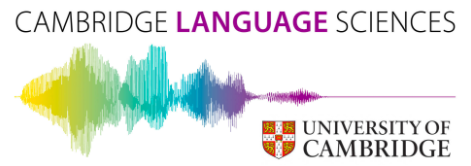A research and networking event for researchers in the language sciences at the University of Cambridge. Now in its third year, this annual meeting of minds brings together established and early careers researchers for an afternoon of talks and poster presentations, and provides an opportunity for informal networking. The theme of this year's Symposium is the link between research in language sciences and tech innovation.

13.00-13.30 Registration and coffee; poster exhibition
13.30-14.30 Keynote lecture: The Use of Deep Learning in Spoken Dialogue Systems - Prof. Steve Young (Dept. of Engineering/Siri Development Team)
Spoken dialogue systems (SDS) provide the core enabling technology for building intelligent personal assistants. The function of an SDS is to understand each user input, decode the users intention or goal and then respond accordingly. Whereas historically much of this functionality has been provided by hand-crafted rule systems, modern systems increasingly rely on statistical models and machine learning. This talk will review the structure and components of a modern SDS and their implementation using deep neural networks. The provision of adequate quantities of annotated training data is a major limitation on progress and the talk will conclude by discussing ways in which this bottleneck might be eliminated.
14.30-15.00 Individualised Language in the Big Data Era - Dr Paula Buttery (Dept. of Computer Science and Technology Abstract pending.
15.00-15.30 Poster slam (1-minute talks by the poster presenters)
15.30-16.15 Poster exhibition; refreshments
16.15-16.45 Using Social Media to Investigate Linguistic Variation and Change - Dr David Willis (Dept. of Theoretical & Applied Linguistics)
Data from social-media platforms such as Twitter have been used to investigate how new words diffuse geographically. However, they have been little used to answer core questions in historical linguistics and language variation and change, such as, what grammatical variation exists and how new grammatical variants spread. This talk will explore their use in this domain, demonstrating some of the methods being developed as part of the ESRC-funded project Investigating the diffusion of morphosyntactic innovations using social media, and will consider whether social media data provide a good proxy for spoken data.
16.45-17.15 Linguistic Yardsticks: Evaluating Language Technology Using Insights from Linguistic Theory - Dr Laura Rimell (DeepMind)
Language technology has achieved remarkable success on practical tasks, such as machine translation and sentiment analysis, while incorporating very little theoretical linguistic knowledge. However, the appearance of success may be deceiving, because standard evaluation metrics for language technology under-represent relatively rare but linguistically interesting phenomena. Poor performance in these areas will be increasingly noticeable as technology advances and users expect more human-like behaviour. I will describe work that evaluates language technology using linguistic yardsticks: datasets designed to focus on specific phenomena, such as the semantic understanding of relative clauses, and I will consider how they may point the way toward improvements in natural language processing.
17.15-18.15 Keynote lecture: Powered by Cambridge: Devices, data and interdisciplinarity - Saul Nassé (CEO, Cambridge Assessment, English)
Cambridge University set its first exam in English for speakers of other languages in 1913. More than 100 years later Cambridge Assessment English reaches more than 5 million learners a year. A learning-oriented approach to assessment is key to successful language learning as is learners' engagement, time and motivation. Building those conditions for success is where innovation is happening at pace: digital technology and collaboration between disciplines is creating a new language learning ecology. That ecology is changing how learners learn, teachers teach and Cambridge English tests. In this talk I will outline how the combination of the communicative approach to language learning and new technology allows us to reach more learners in a way which fits with the learners’ needs and everyday lives without compromising learning outcomes.
18.15-19.45 Reception
Drinks reception supported by Cambridge University Press
**Please note: talks by the speakers will be filmed, but members of the audience will not**
Please register here.


